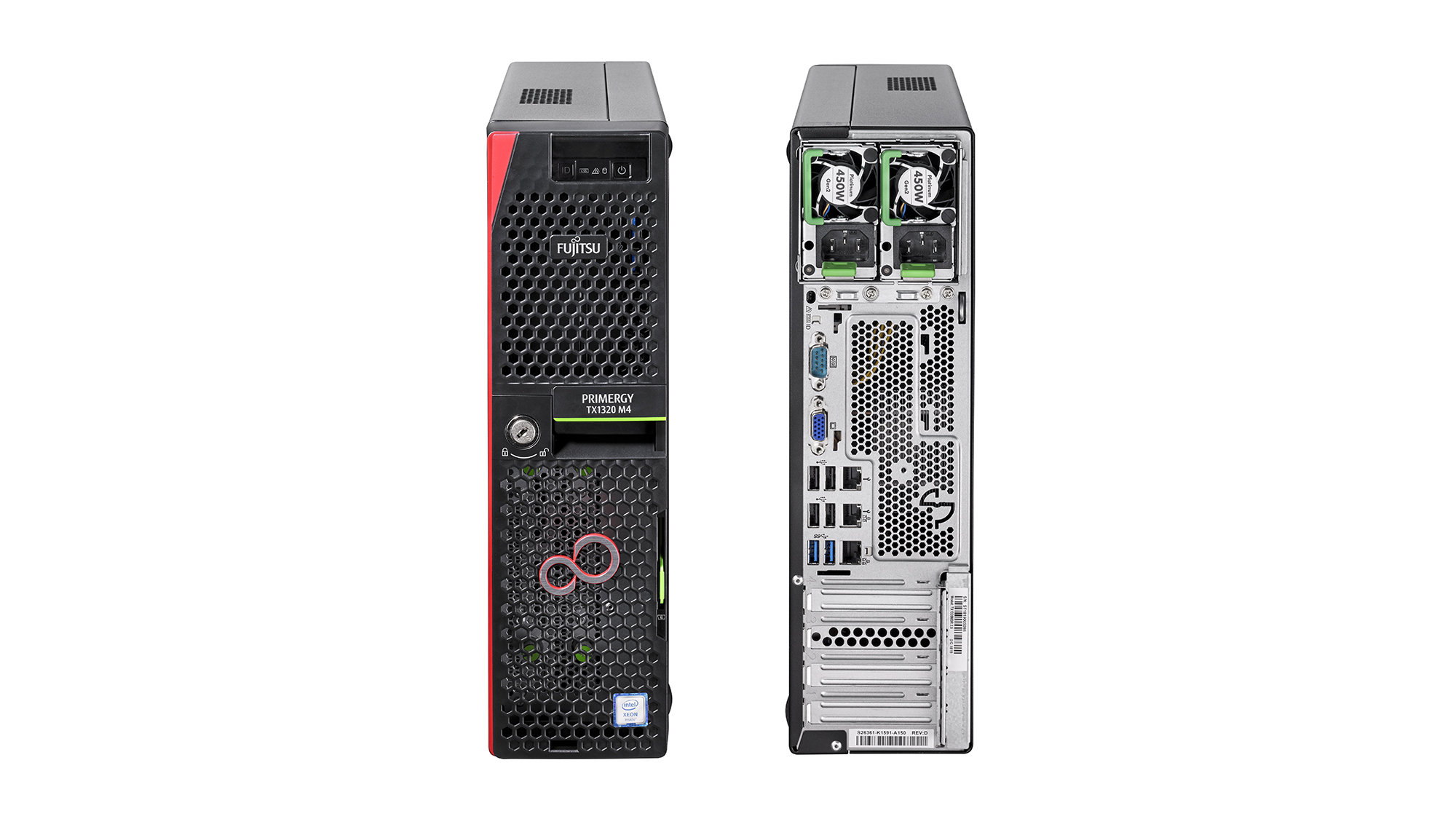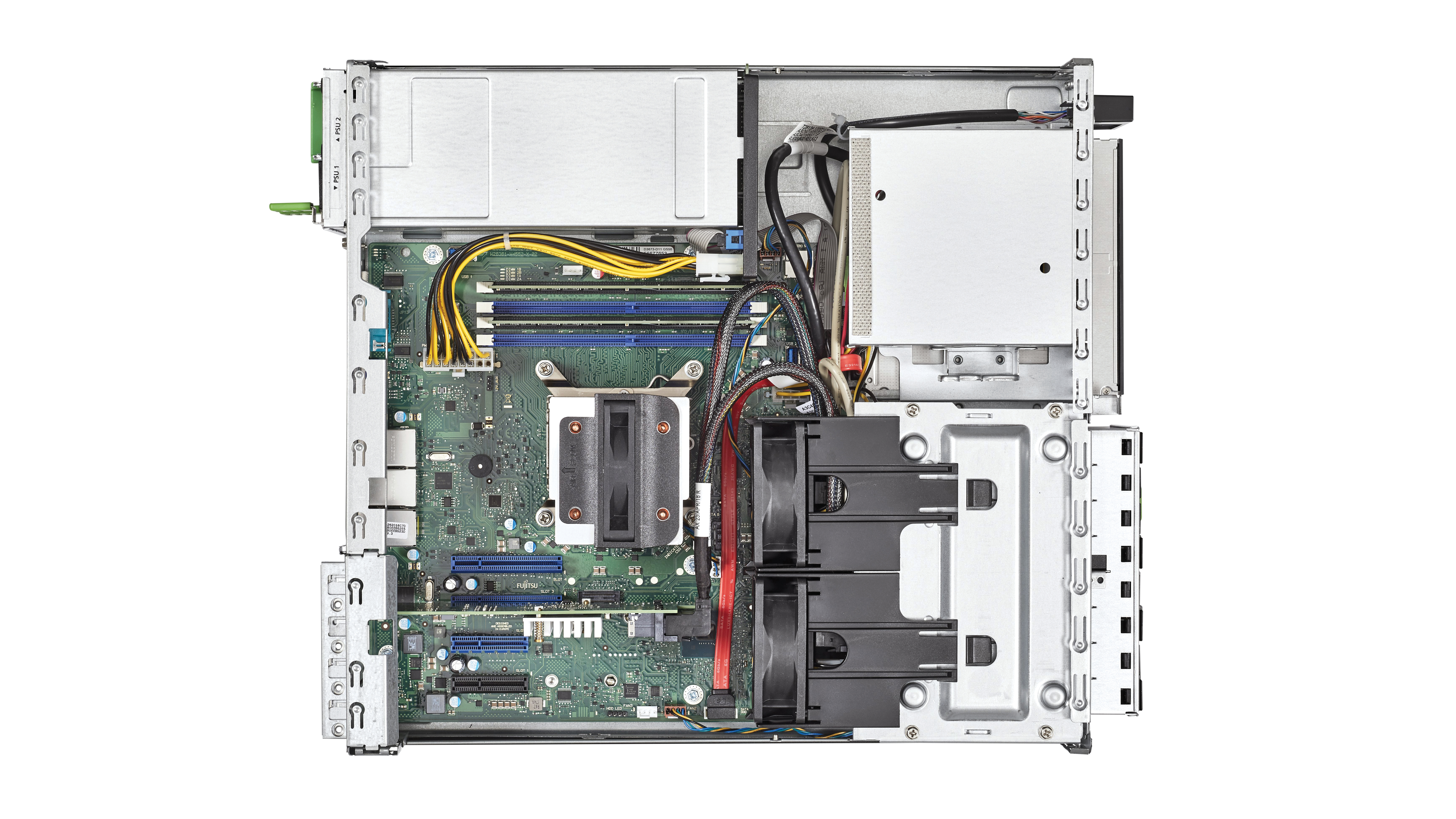Fujitsu Server Primergy TX1320 M4 review: A powerful starter server
A great little server for businesses that want plenty of power but lack the space for a rack


For businesses that need on-premise compute but can't support a whole server rack, the Fujitsu Server Primergy TX1320 M4 is a great option, featuring a range of configuration options in a small package.
-
+
Highly expandable
-
+
Compact design
-
+
Range of configuration options
-
-
ServerView Suite software more suitable to large enterprises

Don't judge Fujitsu's little tower server on size alone. It's certainly small, standing just 405mm tall - but it's a powerful package that's more versatile than many much larger servers.
That's partly thanks to its highly configurable design. The model we tested had a quad-core Xeon E-2134 and 16GB of DDR4 RAM - expandable to a maximum of 64GB - but Fujitsu offers a choice of ten Xeon E-2100 CPUs, with prices starting at just £827 for a base system with 8GB of memory.
There's a wide range of storage choices, too. The entry models support two LFF SATA drives, but for storage-hungry roles, you can specify up to eight hotplug SFF drive bays. If you don't want to go the whole hog right away, you can start with one four-bay cage and add a second extension box when required.
It's worth noting that if you want to use all eight drives, you'll need to add a dedicated RAID controller; happily, Fujitsu offers a great choice of affordable SATA/SAS3 cards. Costing £108, the CP400i adds RAID5 and 50 to the mix, while for around £190 the top-dog EP420i supports RAID6 and 60 arrays, as well as an optional battery backup pack to protect its 2GB of onboard cache.
For faster access, the motherboard also has dual M.2 SSD slots, one of which supports both SATA and NVMe modules. Invest in one of Fujitsu's PRAID EP540i or EP580i dual-function controllers and the server can support up to four high-performance NVMe SSDs.

Expansion in other areas is good, too. Four PCIe slots and a pair of Gigabit Ethernet ports are partnered with a dedicated management port for Fujitsu's iRMC S5 management controller. This can be used in concert with Fujitsu's free ServerView Suite software, but that's primarily aimed at large businesses managing multiple server. Smaller companies will find the System Monitor utility more practical: its browser-based console provides at-a-glance details on critical components and power consumption, with an automated system update service. Upgrading the Standard licence to an Advanced one enables OS remote control and virtual media services as well.
To power it all, starter systems use a fixed 250W PSU, but our configuration included a 450W hotplug PSU with room for another alongside. The second bay also accepts Fujitsu's battery backup module (FJBU) which costs around £300 and includes a Windows management tool that gracefully powers the server down in the event of an outage lasting longer than four minutes.
While the TX1320 M4 may be modest in size, it's no lightweight: the steel chassis is reassuringly solid and offers good physical security, as the side panel can be padlocked shut and the two sections of the front bezel locked with a single key.
Open it up, and everything is nicely accessible. LFF drives are fixed in their cage with thumbscrews and are easy to remove, while the slimline optical drive above is connected to a dedicated SATA port on the motherboard. A spare bay next door can take an optional RDX backup cartridge drive, and the motherboard has an embedded USB port located right next to it.
Thanks to a tidy internal design, not much in the way of cooling is required. There's no need for a rear-mounted fan; instead, the CPU has a smart active heatsink with a fan neatly sandwiched inside it. The LFF model also has a single cooling fan servicing its drive bays, while the SFF model gets a clip-on fan module for each four-bay cage.
This sparing use of fans keeps the server admirably quiet. We measured sound levels of only 37.6dB from one metre in front, so you don't have to worry about nearby workers being disturbed by the noise: it's fine for a small office, or even a library.
In all, the Fujitsu Primergy TX1320 M4 is ideal for space-constrained businesses. Compact yet capable, it's great value, and can be configured to suit a wide range of demanding workloads.
Get the ITPro daily newsletter
Sign up today and you will receive a free copy of our Future Focus 2025 report - the leading guidance on AI, cybersecurity and other IT challenges as per 700+ senior executives
Dave is an IT consultant and freelance journalist specialising in hands-on reviews of computer networking products covering all market sectors from small businesses to enterprises. Founder of Binary Testing Ltd – the UK’s premier independent network testing laboratory - Dave has over 45 years of experience in the IT industry.
Dave has produced many thousands of in-depth business networking product reviews from his lab which have been reproduced globally. Writing for ITPro and its sister title, PC Pro, he covers all areas of business IT infrastructure, including servers, storage, network security, data protection, cloud, infrastructure and services.
-
 Cleo attack victim list grows as Hertz confirms customer data stolen – and security experts say it won't be the last
Cleo attack victim list grows as Hertz confirms customer data stolen – and security experts say it won't be the lastNews Hertz has confirmed it suffered a data breach as a result of the Cleo zero-day vulnerability in late 2024, with the car rental giant warning that customer data was stolen.
By Ross Kelly Published
-
 Women show more team spirit when it comes to cybersecurity, yet they're still missing out on opportunities
Women show more team spirit when it comes to cybersecurity, yet they're still missing out on opportunitiesNews While they're more likely to believe that responsibility should be shared, women are less likely to get the necessary training
By Emma Woollacott Published
-
 OpenAI wants developers using its new GPT-4.1 models – but how do they compare to Claude and Gemini on coding tasks?
OpenAI wants developers using its new GPT-4.1 models – but how do they compare to Claude and Gemini on coding tasks?News OpenAI says its GPT-4.1 model family offers sizable improvements for coding, but tests show competitors still outperform it in key areas.
By Ross Kelly Published